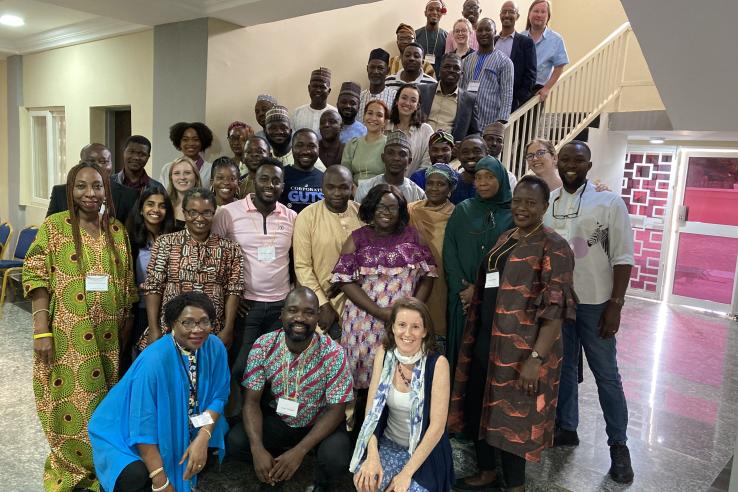J-PAL Africa Evaluating Social Programs Course

Course overview
Our five-day course on evaluating social programs will provide a thorough understanding of randomized evaluations and pragmatic step-by-step training for conducting one’s own evaluation. During the course, participants can expect to gain a clear understanding of why and when a rigorous evaluation of social impact is needed, how randomized evaluations are designed in real-world settings, learn strategies to maximize policy influence and assess the generalisability of research findings, and join a community of practice with other decision-makers who can provide support in the design and use of impact evaluations.
Lectures and case studies use real-world examples from Africa with a variety of themes, including labor, gender, finance, and governance. The course reviews the benefits and methods of randomization, how to choose an appropriate sample size, and common threats and pitfalls to the validity of an evaluation. It also covers the importance of a needs assessment and a theory of change, and how to measure outcomes effectively—tools that are critical for all program evaluations.
To give you a taste for the kinds of projects that can emerge from our Evaluating Social Programs course, please read our first blog in a series illustrating stories of how J-PAL’s training courses have built new policy and research partnerships and strengthened existing ones to advance evidence-informed decision-making.
Applications are now closed
To receive updates about the 2024 edition of the course, please email Priya Nair on [email protected]
Who is a good candidate for this course?
The course is designed for a range of participants from governments, NGOs, international organizations, private sector companies, and foundations, including, but not limited to:
- Policymakers and decision makers in government
- Leaders in philanthropy
- Program implementers and practitioners
- Monitoring and evaluation personnel in NGOs and international organizations
- Research and teaching staff in academic and research institutions
The typical participant is a mid-career professional with an interest in incorporating randomized evaluations into their work. Although not required, some familiarity with economics and basic statistical concepts is helpful.
Not sure if you’re the right fit? Contact the J-PAL Africa training team at [email protected] for more information.
Course format
J-PAL affiliated professors and senior staff with extensive experience implementing randomized evaluations will lead interactive lecture sessions on how to generate rigorous evidence to inform decision-making. Participants will also engage in small group discussions with J-PAL staff and fellow participants working in similar areas, providing opportunities to collaborate and network with their peers. By working through case studies and examples in small groups with the support of staff, participants will solidify new lecture concepts and discuss how they might apply these skills to their own work. Participants will also get a chance to work on a group project, with the assistance of J-PAL staff, and then present it.
View a sample agenda for the course here.
Course objectives
Participants can expect to:
- Gain a clear understanding of why and when a rigorous evaluation of social impact is needed and how randomized evaluations are designed in real-world settings, particularly in African countries;
- Develop a foundational toolkit for measuring impact that includes needs assessments, logical frameworks, and theories of change;
- Gain insight on threats to the validity of evaluations as well as techniques for data analysis, determining the appropriate sample size, and interpreting results;
- Participate in small group discussions to apply new concepts to case study examples and their own work;
- Learn strategies to maximize policy influence and assess the generalizability of research findings; and
- Join a community of practice with other decision-makers who can provide support in the design and use of impact evaluations.
Key information
How to apply: You can complete your application here. As spots in the course are limited and we will review applications on a rolling basis, we encourage you to apply as soon as possible.
Admissions criteria: Although we have no fixed requirements, selection for admission is based on applicants’ organizational responsibilities and organizations’ alignment with J-PAL’s mission of reducing poverty through evidence-informed policy.
Contact: Please contact our training team at [email protected] with questions about applying or details about the course.
Further information: For further information on J-PAL’s Evaluating Social Programs course, including frequently asked questions, please refer to our website.
Fee structure
The fee structure for ESP 2023 is as follows:
| Fee structure | Organizations headquartered in high-income* countries | Organizations headquartered in low/middle-income* countries |
| Multi-national/For-profit/Foundation | $2,000 | $2,000 |
| Academic/ Research | $2,000 | $1,000 |
| Government | $2,000 | $700 |
| NGO | $2,000 | $500 |
| Discount (NGO rate) | See note | See note |
* World Bank Income Categories
Note: Determined on a case-by-case basis.